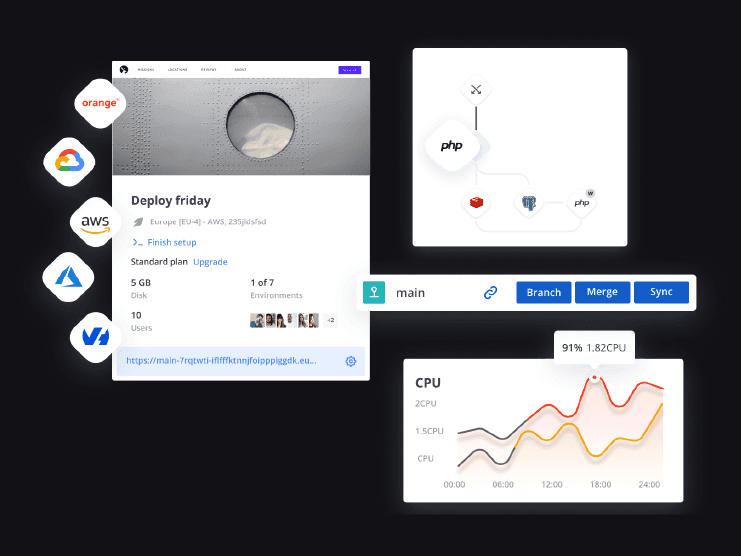
A tale of people: the human impact of adopting Platform.sh
I have a complicated relationship with people. On the one hand, I don’t like people (bear with me—it’s not what you think). On the other hand, I love a person.
What I mean is, I struggle with the day-to-day superficial interactions we’re expected to have. The small talk, the work exchanges, the obligatory pleasantries—it’s hollow, and it feels empty. In that sense, people are exhausting for me. But when I catch a glimpse of the real person beneath that surface, that’s when I feel a connection. I love discovering what causes the spark in someone’s eye, or what brings out a sad or joyful countenance. I’m fascinated by what makes someone shine, or, on the flip side, what turns them bitter. I love a person—not the mask they wear, but the true self that might show more rarely than one would like to admit.
It reminds me of a novel by the Italian writer Luigi Pirandello, One, No One, and One Hundred Thousand. The central idea is that each of us has our own perception of who we are, but that perception is never quite the same as how others see us. Everyone has their own filtered image of who we are, which leads to the strange conclusion that each person is not just one person—but a hundred thousand different ones. In the end, we might feel like we’re really no one at all. But here’s the thing: the mask we wear, or the version of ourselves that others create in their minds, isn’t fixed. With just a little conversation, with a bit of care, we can begin to uncover the real person in front of us. We just have to be willing to look.
I like to think that over the years I’ve become better at taking a step back to truly study people. I try to be slow to judge, quick to observe. It doesn’t always work, but at least I try. When I am leading a team, I want to know what pain—yes, even just “work pain”—someone might be going through. And if there’s something I can do to help them—after all, giving is a greater blessing than receiving. Often, the obstacles and frustrations we face in our work are things we can change. Burdens can be lifted, distractions can be replaced by opportunities, and environments can be shaped to allow people to thrive.
Today, I’d like to try and show you how a product like Platform.sh can do just that.
Once Upon a Time
There was a time when I led a team of developers through multiple migrations, all while working on the development of hundreds of websites.
By the time we reached the point of migrating to Platform.sh, these websites had been meticulously crafted over the years on custom-built, bare-metal hosting and CI/CD systems. But what lay ahead wasn’t just a technical challenge—it was going to be a personal journey for everyone involved.
Ever since I had led the team away from FTP-based deployments, heterogeneous local development environments, and inconsistent copies of Git repositories, some members had to face new challenges: CI/CD pipelines, inconsistently configured production and staging environments, and deploying to remote (and admittedly not-so-stable or well-configured) dev/test environments. Back in those days, DevOps was starting to make its way into many development teams, and some of my people didn’t take to it easily. It was hard to get right, too.
As the lead architect, I was responsible for guiding the team through this process. But what struck me the most wasn’t the technical hurdles—it was the human ones.
People were afraid. People were frustrated. Some even questioned whether they belonged in the field at all. The migration became a crucible that tested not just our technical abilities but our resilience, our trust in one another, and, ultimately, our capacity to grow as individuals. What I saw during that time weren’t just developers—they were people, real people with their own insecurities, ambitions, and struggles. And through the adoption of Platform.sh, I watched them transform in ways that went far beyond code.
Let’s take a closer look at some of their stories.
The Fearful
“No More Changes, Please!”
Let’s call him Dave. Dave wasn’t the type to voice his fears, but I saw them in his eyes every time the upcoming migration to Platform.sh was mentioned. He didn’t need to say a word—his silence spoke volumes. I could see the tension in his face, the slight hesitation in his responses. He wasn’t just reluctant to change; he was afraid of it. But this wasn’t a fear of technology itself—it ran deeper. Dave’s real fear was more personal: the anxiety that this migration would pile on even more complexity and tedious tasks to his already full plate.
What really haunted Dave was the fear that this change would expose his limitations, that he wouldn’t be able to keep up. And in the fast-paced tech world, where change is constant and unforgiving, that kind of fear can be paralysing.
Yet, when we finally made the migration to Platform.sh, something remarkable happened. The true value of Platform.sh was finally revealed. The weight of managing infrastructure, constantly firefighting operational issues, and dealing with tedious scripts and tasks no one had asked for was lifted from Dave’s shoulders. For the first time in a long while, he was free to focus on what he excelled at: writing great code. And in that freedom, he found confidence. No longer bogged down by things outside his control, Dave’s work improved. He produced more, with enthusiasm and a renewed sense of pride.
Watching him grow into his potential was one of the most rewarding experiences I’ve had as a leader. Dave didn’t thrive because he changed as a person, but because the barriers that had held him back were removed. He found his spark again, and it was truly beautiful to witness.
The Frustrated
“I Couldn’t Care Less About Ops!”
Then there was Sarah (let’s call her that, shall we?). Sarah was good at her job—really good, in fact—but you wouldn’t have guessed it from her overall performance. She was disengaged, frustrated, and often angry. Not because she didn’t care, but because she was being forced to care about things that drained the life out of her. The thing is, she could do them—she just didn’t want to. And that frustration spilled over into her core role, affecting everything she did.
Now, you might think, “Well, everyone has to do things they don’t like at work—just suck it up.” And sure, that’s true to a point. But should a front-end developer really have to spend her time debugging pipelines and troubleshooting infrastructure? Especially when it’s something that can be avoided?
Those tasks sapped her energy, pulling her away from what she was passionate about. Every time she had to dive into areas she didn’t care for, it didn’t just affect her output—it chipped away at her personally. You could see the toll it was taking in the tension on her face, and hear the frustration in her voice. It wasn’t just work; it was affecting her whole sense of worth.
Platform.sh was a lifeline for Sarah. By taking away the operational headaches she despised, it allowed her to refocus on her true passion. Almost overnight, her attitude shifted. She went from frustrated and disengaged to excited and creative. She started producing some really good work. Platform.sh didn’t just make her life easier—it gave her back the joy of doing what she loved. And that, in turn, lifted the whole team’s spirits.
The Defeated
“I’m Rubbish at This”
Let’s call our third friend Michael. If ever there was someone who wore their heart on their sleeve, it was him. Every time we hit a bump in the road, he seemed to deflate. “I’m rubbish at this,” he’d mutter under his breath. But words are powerful, and that’s not something anyone should be repeating to themselves too often.
Michael’s struggles weren’t down to a lack of ability—far from it. But the relentless grind of managing infrastructure and operations took its toll on him. He was a developer who thrived in a stable, predictable environment, yet our rather chaotic DevOps setup, and the handling of several custom-built systems drained his energy and confidence. His attitude was to try and bring order out of chaos, but this beast was too hard to tame. He felt out of place, out of control, and it showed in his work.
The migration to Platform.sh became a turning point. The overwhelming complexity that had worn him down vanished. The platform’s stability and standardisation provided the predictability he desperately needed. And with that, his confidence began to return. It wasn’t just about mastering the platform—it was about rediscovering his own value. It turns out he could indeed bring order out of chaos. Just not out of the complex infrastructure and DevOps set up we had up to that point.
Michael transformed from feeling defeated to becoming one of our most reliable contributors. He found his place, and the whole team benefitted from that.
The Lone Wolf
“Out for Himself”
It’s not all feel-good stories of personal growth—let’s talk about Chris (another pseudonym, of course), our “lone wolf”. Chris was different. He thrived in the chaos, priding himself on his deep technical knowledge of our old, fragmented infrastructure. For him, the unpredictability and constant firefighting were opportunities to prove his worth, to position himself as indispensable. But in a team environment, that mindset can become toxic.
The shift to Platform.sh didn’t sit well with Chris. The platform’s simplicity and standardisation removed the need for a hero to swoop in and save the day. While this was a relief for most of the team, it felt like a threat to Chris. He wasn’t interested in being part of a well-oiled machine—he wanted to be the one keeping it together. When Platform.sh eliminated the chaos, it also took away his edge.
Eventually, Chris came to the realisation that this new environment wasn’t for him, and he decided to move on.
People first and foremost
The technical benefits of Platform.sh are undeniable—stability, performance, and almost zero ops. But let’s set aside the cold metrics for a moment and remember what really matters: the people.
No, I’m not about to make the tired speech about how a company is a family. I don’t believe that. Families are bound by unconditional love, but in a company, it’s different. Yes, each person deserves respect and care, but let’s be honest—employees are expected to perform. It’s the nature of the contract. So, why not focus on helping our people perform their best?
And it’s not just about training, professional development, or better tools. It’s about recognising the human side of work. It’s about caring for the people behind the job titles.
What stood out to me—and still does—is how introducing Platform.sh as the backbone of our workflow transformed the people on my team. By removing the burdens that had been holding them back, Platform.sh gave them the space to rediscover their strengths, to thrive in ways they hadn’t before. Dave’s journey was one of fear turning into confidence. Sarah went from frustration to flourishing in her creativity. Michael found purpose where there had once been defeat. And in some cases, like with our lone wolf, it became clear that Platform.sh helped us see who wasn’t aligned with the team at all.
In the end
At its core, this isn’t a story about technology—it’s a story about humanity. It’s about creating an environment where people can be themselves, where they can focus on what they love and excel at. Platform.sh didn’t just optimise our systems—it empowered our people.
And in the end, isn’t that what we all want? To be seen for who we really are, to be given the space to grow, and to find fulfilment in the work we do?
Platform.sh isn’t a magic wand, it’s not a miracle cure, and it’s certainly not a spiritual awakening. But it’s a darn good product. One that makes teamwork better—on every level, even the human one.
 Switching to Platform.sh can help IT/DevOps organizations drive 219% ROI
Switching to Platform.sh can help IT/DevOps organizations drive 219% ROI Organizations, the ultimate way to manage your users and projects
Organizations, the ultimate way to manage your users and projects




